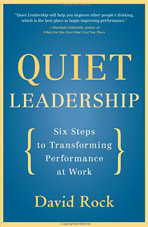Four stages to Insight
- On 28-10-2010
Have you ever had an “ah-ha” moment?
Archimedes did, apparently, when he stepped into his bath and noticed that the bath level rose by the volume displaced by the volume of his body. Archimedes yelled “??????!” (or Eureka which is Greek for “I have found it!”) before he went running through the streets half-naked excited about his discovery!
Insights come to us seemingly only at certain times and the process doesn’t seem to be reproducible. But insights is what is at the core of our learning and the learning of all human beings. What if we could make it reproducible?
David Rock in his recent book, Quiet Leadership, has given us an insight into insights.
David discusses recent neuroscience research that suggests that there are four stages to insights. The following is my paraphrasing from David Rock’s book and other researchers.
The First Stage: Awareness
Consider that the brain forms mental maps that gathers the information it has stored into some cohesive whole. As a way of accessing the information and ordering it has organised the information and patterns it has discerned into some map and then uses these maps to interpret and relate to the world.
In this first stage the brain is immersed in new information. It could be new perspectives about something we are examining in a class or heard on TV or are currently reading in a book. New information is essentially being processed and the brain is attempting to fit these ideas, thoughts and concepts into its current mental maps. As the brain attempts to integrate the new knowledge it begins to see that there is a dilemma because the new knowledge is creating a different mental map than the one that currently exists but the brain has not yet worked out how to reconcile this conflict by creating a new metamap or by reconfiguring the existing maps.
The Second Stage: Reflection
If one is to develop a consistent process of having insights and thus more productively then there needs to be more second stage “reflection” time in our days.
MRI scans show that people’s brains give off alpha-band waves just before they come up with an insight. Alpha waves correlate with people shutting down inputs from their external senses and focusing on internal stimuli. When we perform tasks that engage the conscious, logical mind we decrease the alpha-band waves. So reflection is NOT helped by asking your students to reflect by writing down their reflections (which is what many teachers do). The writing process should occur after true reflection.
Studies have shown that during reflection we are not thinking logically or analysing data; we’re engaging a part of our brain used for making links across the whole brain. We are thinking in an unusual way, tapping into more intelligence than the three to five pieces of information we can hold in our working memory. We are allowing the brain to think across the whole dataset of ideas, images, thoughts, knowledge to connect and reconfigure its mental maps without any new input from the conscious or working memory.
A simple process to reflect is to sit still and close your eyes (this removes about 70% of external stimuli) and focus on your breathing. Listen to the way you inhale and then exhale for about 60 seconds. Then open your eyes just a fraction and close them again. This sends you deeper into the alpha-band state. Listen to the way you inhale and then exhale for another 30 seconds and then open your eyes and write down your reflections. During this period you don’t think about anything logically just focus on your breathing.
By the way, we have all experienced this process naturally. Quite often we have insights when we are lying in bed before we go to sleep or when we wake up. It is in the quiet “non-logical”, “non-thinking” times that we suddenly go … “ah-ha”!
Third Stage: Insight
At the moment of insight our mental maps have been reconfigured or a new mental map has suddenly snapped into existence. In this moment the body releases various neurotransmitters like adrenaline as well as possibly serotonin and dopamine. This is why there is a sudden excitement and a rush throughout the body.
The intense motivation from having an insight is short term. If you can get people to take tangible actions while the insight is close at hand, even just to commit to doing something later, this will be a big help to ensuring new ideas become reality. If you don’t take some action then and there the insight and new mental map is not reinforced and the insight is lost.


0 Comments